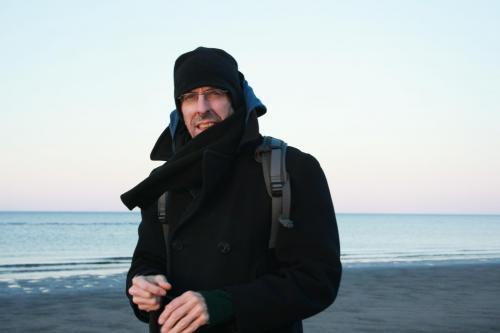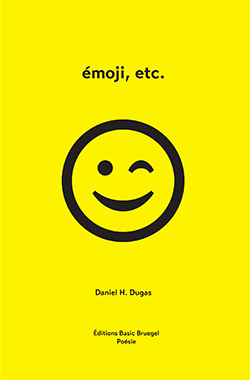Books: Frye Festival roundtable features Daniel Dugas, Michael Happy, B.W. Powe and Serge Patrice Thibodeau (2011)
by Shannon Webb-Campbell
For the Telegraph-Journal
Monday April 25th, 2011

Writer Daniel Dugas says there’s a third dimension to a book that is hard to replicate in a virtual form.
Photo: Courtesy Valerie LeBlanc
Technology changes, but the written word remains the same.
Writers Daniel Dugas, Michael Happy, B.W. Powe and Serge Patrice Thibodeau host a roundtable discussion revolving around technology’s influence and effect on reading Wednesday at this year’s Frye Festival in Moncton.
“Physically we have developed a talent to read on small screens and to stare at bright lights for long periods of time,” says Dugas, a writer and new media artist. “We can even do that while walking or driving. Content is available 24-7, dressed up in all different suits at our fingertips.”
As a society we’ve become dependent on technology, addicted even. It’s most common to rely on e-readers, iPads, Kindles and reading newspapers, magazines and literature online. The advantage of technology resides in accessibility, documents are readily available that were once tucked away in libraries, research centres and universities.
“A book is a book is a book,” says Dugas. “There is a third dimension to the book that is hard to replicate in a virtual form. Our brains are good at that, feeling all of the dimensions. We have a spatial memory that enhances our reading, we take mental notes without even realizing it. Somehow we remember that a passage that we were trying to relocate in the book is on the bottom left or the top right.”
As a writer and publisher, Serge Patrice Thibodeau embraces technology yet firmly believes the bound and printed will persevere. In terms of history, the book is relatively new, being only 500 years old. At one point and time no one owned books. Every single book had to be handwritten and transcribed.
“Print will always be there. We will never abandon the book,” says Thibodeau. “When Life Magazine first started it was declared as the death of the book. People thought magazines would take the place of the book.
“The paper book will always remain, we don’t want to spend the rest of our lives in front of a computer or a screen. I think it would be too soon or fatalistic to predict the death of the book.”
Mohawk University professor Michael Happy adores books, though knows even his own reading has been influenced by technology’s shift. As a Frye scholar, he opens one of his 30-volume texts every day, though notes Google is a go-to quick reference.
“I’m a book person and I find myself like a water fly skittering from text to text,” says Happy. “It’s a big deal for me to sit down with a book, which I find I must take time to do.”
Happy believes it’s not the book that matters, it’s the literature. A culture is founded within its literature – imagination, storytelling and art. Long before the book, oral storytelling preserved culture. He says technology is altering our culture.
“The reason literature and all arts speak directly to us is the articulation of imaginative constants, the things that make us human,” he says. “These things are constant, the vernacular changes and sometimes the delivery changes, yet the human condition doesn’t change.”
Technology has changed the way we communicate. While language is fluid and continuously developing, the role of technology is changing our experience of it. Happy notices this most in the classroom.
“Our language is changing, you can see that in an awful lot of ways,” he says. “There is a vernacular, abbreviations, acronyms and all sorts of code that people speak and write to make the experience more efficient. These are very direct changes on the language. Is it a change for the worse? I don’t know.”
The Frye Festival roundtable New Technology and the Changing Face of Reading, featuring Daniel Dugas, Michael Happy, B.W. Powe and Serge Patice Thibodeau, takes place Wednesday at noon at Moncton City Hall. For information, visit www.frye.ca.
Questions & Answers
Interview with Shannon Webb-Campbell
How is technology changing the way we read?
I think it is fair to say that technology has changed the way we read and perhaps even what we read. Physically, we have developed a talent to read on small screens, to stare at bright lights for long periods of time. We can even do that while walking or driving. Content is available 24-7, dressed up in all kinds of different suits at our fingertips. We have become dependent and addicted to technology, sending shorter and shorter messages all the time.
One of the best things technology has done for reading is to have given voices to many people. I am thinking particularly of the rise of the blogs in the late 1990’s.
How are iPads, Kindles and e-readers influencing our reading? Are we reading less or are we reading more as a society?
I don’t know if we are reading more, but one thing is sure is that we are downloading a lot more. There are an enormous amount of public domain books available, on Feedbooks, Internet Archive, Amazon, the digital library Gallica, etc. E-readers make it easy to access them. The drawback in the public domain books is the number of mistakes, typos that can be found. It can be quite discouraging.
Is print dead?
This is not a new fear. In the mid-1800s when the French painter Paul Delaroche, saw his first Daguerreotype, he said that painting was dead. The power of representation of the photographic medium was scary for many painters, but we know that it was not the end. The same challenge exists now with print, but I believe that it will adapt.
Recently I interviewed Alberto Manguel, the world’s authority on the book. He says the production of the book has always been influx. Personally, he’d rather read the bound and printed (he does have a library boasting 35,000). What’s your take on the future of the book?
A book is a book is a book. There is a third dimension to the book that is hard to replicate in a virtual form. Our brains are good at that, feeling all of the dimensions. We have a spatial memory that enhances our reading when we read we take mental notes, without realizing it. Somehow we remember that a passage that we trying to relocate in the book is on the bottom left or the top right. I have a Kindle and I like it a lot, the electronic ink is just beautiful, but that does not take away from the feeling of holding a book. These are two different things and I think that is where the power of the book lies.
How does technology change our relationship to reading? What is the difference between reading something as a hard copy (in book form) versus on an e-reader?
Access to knowledge is probably the biggest advantage of technology; we can read books and documents that were inaccessible before. Depending the kind of reading, if it is exclusively e-books, that is great but when it comes time to annotate a book, I prefer to have the real thing. Keeping track of information can be challenging.
(I finished reading Manette Salomon a book from the brothers Goncourt, for a course at the Université de Moncton and I think it would have been difficult to keep track of my tabs in an e-book – see picture)
What is your opinion or prediction for the future of reading from a technological perspective?
It will accelerate and become even more pervasive.
What are the advantages to e-readers?
As stated by the marketers – portability. Read anywhere, save trees, etc.
How does technology influence and shape your own art?
I am a writer and a new media artist as well. My first encounter with a new technology (at the time when it was new) was in the mid-80’s with the MIDI protocol (Musical Instrument Digital Interface). I thought that it was fascinating and that the possibilities were endless! Basically, I have always seen technologies as enablers, as tools, and I continue to use them in that optic.
Leave a comment
Daniel H. Dugas
Archives
Blogroll
- A.I.R. Vallauris
- ACAD
- Adobe additional services
- Adobe Creative Cloud
- AIRIE
- Amaas
- Amazon Author Central
- ARTothèque
- Australian Poetry
- Basic Bruegel
- Bitly
- CCCA
- CDBaby
- Cycling 74
- Dissolution
- Éditions Prise de parole
- Emmedia
- eyelevelgallery
- FAVA
- Festival acadien de poésie
- Festival FRYE Festival
- FILE – Electronic Language International Festival
- Freeware list
- Fringe Online
- Galerie Sans Nom
- Gotta Minute Film Festival
- Instants Vidéo
- JUiCYHEADS
- Kindle Direct Publishing
- Klondike Institute of Art and Culture
- La Maison de la poésie de Montréal
- La Maison de la Poésie et de la Langue française Wallonie-Bruxelles
- Laboratorio Arte-Alameda
- Le Centre Jacques Cartier
- Liberated Words
- Maison Internationale de la Poésie – Arthur Haulot
- MediaPackBoard
- Miami Book Fair International
- Monoskop
- Mot Dit
- NSCAD University
- Paved Arts
- PoetryFilm
- Portail des auteurs du Nouveau-Brunswick
- RECF
- Revue Ancrages
- Salon du Livre du Grand Sudbury
- Sculpture Space
- Subtropics.org
- Sydney college for the arts
- The Centre for Contemporary Canadian Art
- The New Gallery
- Trevigliopoesia
- tumbler-documents
- V Tape
- Valerie LeBlanc
- VideoBardo
- Void Network-Κενο Δίκτυο
Categories
- #covidpoèmes
- Advertisement
- AIRIE
- Ancrages
- anthology
- Anthropocene
- Architecture
- Around Osprey
- art
- Article de presse
- arts visuels
- audio
- Australian Poetry
- Basic Bruegel Editions
- Book
- book fair
- Cafe Poet Program
- Ce qu'on emporte avec nous
- Citations gratuites
- Collaboration
- commentaire
- commentary
- Compte rendu
- conférence
- Conservation Foundation of the Gulf Coast
- COVID-19
- Critique littéraire
- culture
- Daniel Dugas
- Design
- Édition Michel-Henri
- Éditions Perce-Neige
- Éloizes
- Emmedia
- emoji etc | émoji etc
- Environnement
- essai
- essay
- Everglades
- Exhibition
- festival
- Festival acadien de poésie
- Festival Frye Festival
- FIPTR
- Flow: Big Waters
- Fundy
- Habitat
- installation
- Instants Vidéo
- interactivity
- journal
- JUiCYHEADS
- Kisii
- L'Esprit du temps
- laptop
- Leaving São Paulo
- lecture
- Livre
- logos
- Magazine
- Miami Book Fair
- Moncton 24
- novel
- OASIS
- oil spill
- perception
- performance
- Photo
- poésie
- Poetic Licence Week
- Poetry
- politics
- politique
- press
- Prise de parole
- Revue Ancrages
- salon du livre
- sculpture
- Sculpture Space
- sound
- Souvenirs
- Spirit of the Time
- Style & Artifacts
- Symposium d'art/nature
- talk
- television
- The New Gallery
- Uncategorized
- Valerie LeBlanc
- vidéo
- vidéopoésie
- Videopoetr/Vidéopoésie
- videopoetry
- visual arts
- What We Take With Us
- youth literature







